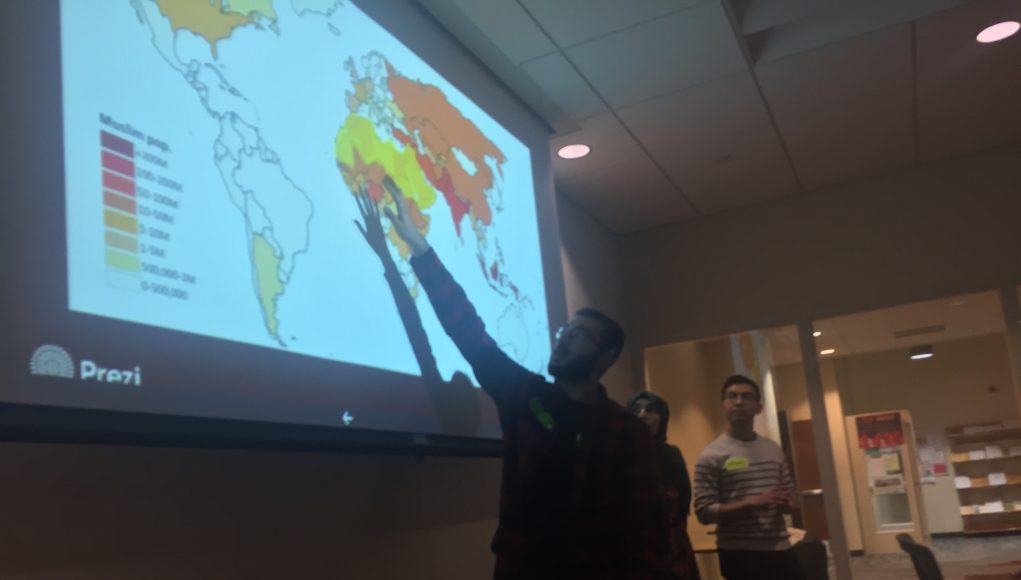 To continue efforts in uniting the student body, the Associated Students of Madison (ASM) hosted an extensive conference called “New People, New Voices” this past Saturday at the University of Wisconsin – Madison to empower students through learning about grassroots organizing and interacting with other students on engaging in activism on campus.
To continue efforts in uniting the student body, the Associated Students of Madison (ASM) hosted an extensive conference called “New People, New Voices” this past Saturday at the University of Wisconsin – Madison to empower students through learning about grassroots organizing and interacting with other students on engaging in activism on campus.
A six-hour event held at the Student Activity Center, “New People, New Voices” comprised four rounds of strategy and educational workshops by student organizations on campus informing on grassroots organizing and advocacy, team building, sexual assault and bystander intervention, and how to professionally network and use social media to mobilize.
“I want people to learn that there are things that affect and impact all of us as students no matter political ideology. If they take something away and feel more part of the UW-Madison community because they were part of this and know more about the community, that was the goal and I’d be really happy if people walked away knowing that,” Carmen Goséy, Chair of Student Council in ASM and one of the primary organizers of the event, said in an interview with Madison365.
 “New People, New Voices” hailed around 80 attendees with 15 student organizations such as End Violence on Campus (EVOC), Sex Out Loud, ASM, the Center for Leadership & Involvement, and the Muslim Student Association (MSA) facilitating workshops and discussions on different topics. Students engaged in challenging discussions about rape culture on campus and combating discrimination as well as technical skills on writing travel and event grants and leadership skills.
“New People, New Voices” hailed around 80 attendees with 15 student organizations such as End Violence on Campus (EVOC), Sex Out Loud, ASM, the Center for Leadership & Involvement, and the Muslim Student Association (MSA) facilitating workshops and discussions on different topics. Students engaged in challenging discussions about rape culture on campus and combating discrimination as well as technical skills on writing travel and event grants and leadership skills.
The purpose of “New People, New Voices” this year was to learn about grassroots organizing and student organizations on campus, expose students to diverse perspectives, and to make the campus feel more like a community.
Abby Roberts, a freshman majoring in International Studies, said that she felt “hopeless” after the election of Donald Trump and attended “New People, New Voices” to learn how to be more active on campus to combat the Trump presidency and support those who will be most affected by it.
“Sometimes it’s easy to think that we can’t do anything even if we wanted to and there’s no way we could. It’s refreshing to know that’s wrong,” Roberts said.
Among the represented student organizations was MSA, which facilitated an educational workshop on the misconceptions of Islam, how they are combating Islamophobia, and how others can support Muslim students on campus.
Akmal Hamid, a senior from Malaysia and Marketing Chair of MSA, said that it was particularly important for him to come to the event because he represents “one part of Islam the media doesn’t show.”
“For people who are not familiar with Islam, they would never imagine a Muslim to look like this,” said Hamid, who has features many would think of as Asian. “That’s one whole story that people are missing out on, which conjugates to ignorance of Islam so I want to help combat that and I want to break the stereotypes.”
One senior, Sara Easa, appreciated the detailed planning structure of each workshop she attended. Each workshop laid out goals both short-term and long-term, strategies, and a list of people to contact to achieve these goals, which Easa believed were effective and “realistic” ways to achieve certain goals. Easa added that she wanted to be more involved in efforts to integrating free feminine hygiene products on campus after attending an ASM workshop about it.
Moving forward from the conference, sophomore Jacob Gardner and ASM rep said that he learned “the key is we learn and from that we are able to teach.” He said that he would like to have more conversations on whiteness and rape culture with his social circles and others on campus particularly because people of his demographic are “perpetuating” it.
“I’m in a position as a leader and a man on campus and I have the leverage to make change because you can’t teach the victim not to get raped; you can only teach people not to rape and that’s the main goal,” Gardner said.
With more conversations and discussions occurring Isha Hammad, a junior and Vice President of MSA, emphasized the importance for events like this because it expresses the needs of different groups and how others can support their goals.
“For social justice to work you need people, you need bodies, you need them to know you exist. I think this is a great way to show that; to show that this is what we need help with and this is what our mission is and if you can help support that then that’s the goal.”
This piece was produced by a student reporter in the Madison365 Academy. To learn more and support our educational programs, visit madison365.org/academy.




























